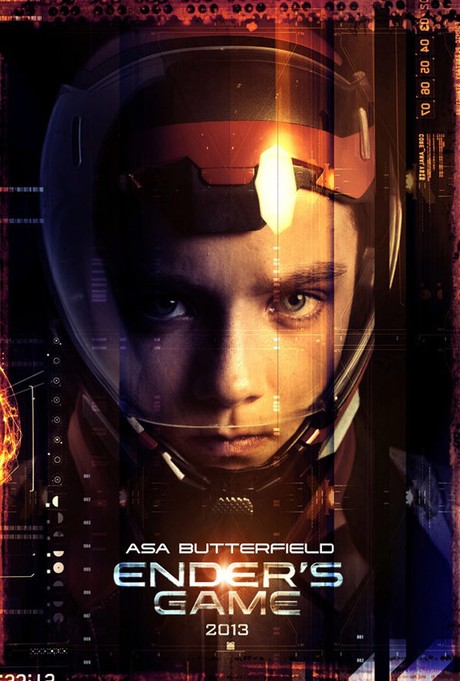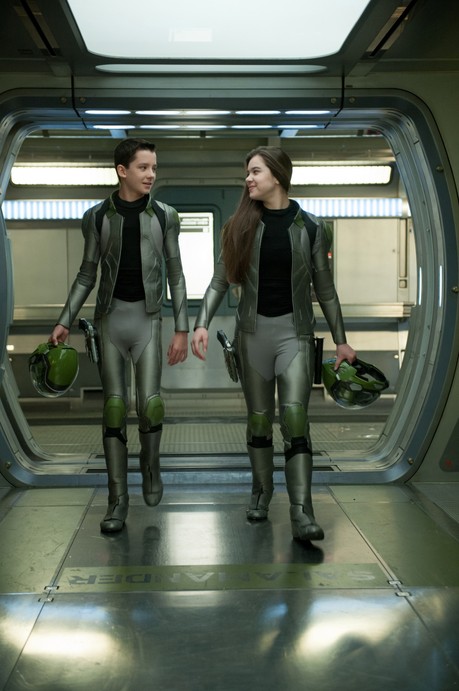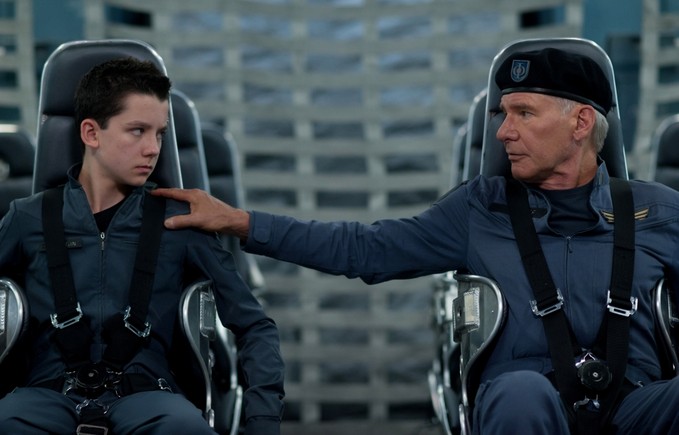Ahoy, squirts! Quint here with the first of a few Ender's Game interviews for you to read over the weekend. What's interesting about these chats is that they weren't conducted in some junket setting where these poor bastards are stuck in a room for three days straight trying to give varying answers to the same handful of questions.
Every Ender's Game interview you're going to read from me was conducted on the set during my exclusive day watching them work (read my report on that here!). What's good about that is I ended up being lucky enough to be one of the first journalists any of these folks talked to about the movie, so I got some exceptionally good conversations out of the kids and director.
We're going to start with Ender himself, Asa Butterfield. They had just shot the scene in which Ender is given command of his first Army at Battle School and were moving on to one of the Battle Room sequences. Butterfield was decked out in his Battle Gear, but found some time to pull up a chair and talk with me about the many layers of Ender as a character and working with an actor as intimidating as Harrison Ford.
Enjoy the chat!

Quint: Ender is a fascinating character. There's a great conflict within him, I think...
Asa Butterfield: Yeah. Is he Peter? Is he Valentine?
Quint: Absolutely. He's also being pushed and pulled by everybody, yet still has to find out who he is himself. What I love about the character is that he has a brilliant strategic mind and can see how to achieve any of his goals no matter what the cost, but he still has a great empathy. Can you talk a little about what traits you think are the most important to get across to an audience?
Asa Butterfield: As you said, that whole internal struggle within him was one of the things the really drew me to the project. He has his moments of kindness and passion and he has his moments of violence and aggression, more of his brother's influence. I've always wanted to play more of a darker character, so this has given me a chance to play the lighter and dark side, so it's perfect.
There's a lot going on inside Ender's head. One of the things me and Gavin (Hood) talked about was that when he's looking at people, a way to communicate to the audience what he's like is that he's always calculating, he's always analyzing. Is he a friend, is this person going to be an enemy? Why is he doing this? Why is he doing that? Gavin has these really tight closeups, so I'm trying to get this information flicking through my eyes.
Quint: That's got to force you to be really subtle with your performance, then.
Asa Butterfield: Yeah, it has to be subtle.
Quint: Do you find doing those kinds of shots are more challenging than delivering a big dialogue moment since so much of it rests in tiny twitches of muscle and internalized thought? Like in the shot today with you and Harrison that you were clenching your jaw. It's a small detail, but it told me immediately that you were anxious.
Asa Butterfield: Your whole body moves, it's not just your eyes. A lot of the communication is through the eyes, but the whole body reacts to your emotions. It's really important. Gavin also does the wide shots where you can see that.
Quint: One of my favorite parts of this story is the relationship between Graff and Ender. I was speaking to Gavin earlier and he was saying one of the tragic things about Graff as a character is that by the time he realizes he cares for this boy, Ender doesn't view him as an ally anymore, he views him as kind of...
Asa Butterfield: An enemy.
Quint: Exactly. It's too late for there to be a meaningful, patriarchal relationship between these two people. How much did you and Gavin explore that relationship while you were preparing for the movie?
Asa Butterfield: Me and Harrison have done a few scenes. One of the first scenes we did was where he first talks to me about going to battle school when we're back on Earth. That scene is quite intimate between us and at that point Ender is thinking of Graff as his ally, but then he's almost instantly being pushed away by Graff when he reaches battle school. Ender doesn't know what to think of him at that point.
The scene we filmed with him this morning is where it shifts again and Ender's still confused about what Graff's real intentions are, but he doesn't know that Graff is manipulating him yet. The scene we did this morning switches the relationship again, so it's always changing.
Quint: What's it like working with Harrison?
Asa Butterfield: I love working with Harrison. He's a brilliant actor and I think we play off each other really well. He's a really nice guy, but he's the perfect Graff.
Quint: It seems like he can be steely when he needs to be.
Asa Butterfield: And compassionate when he needs to be.
Quint: The scene today is a perfect example. He goes from stern to joking about the Dragon army suits. He seems to be giving Graff a lot of life, which is good to see because he could have easily chosen to make Graff a straightforward bastard.
Asa Butterfield: Right. It's a lot more complex.
Quint: We have to talk about the battles themselves. How challenging are these sequences as an actor? You're having to juggle your performance with very technical physical stuff, like hitting your mark while floating. Is it a kind of trial and error process?
Asa Butterfield: It is. When we first got on wires I was a bit shaky. I wasn't very good on the wires. None of us were, but after weeks of practice we eventually were able to flip slowly. The majority of our movement was controlled by stuntmen in the gantry, moving us side to side and up down. The hardest part was acting as if you were in zero-g. At some points you have to be angled forward, so it's a pretty good ab workout because you have to be hanging there for minutes, so you're just sort of tensing, but at the same time you have to move very fluidly. That's one of the hardest parts.

Quint: Do you find it difficult to find your performance when you're on the wires because you're thinking of all the technical stuff too?
Asa Butterfield: At first I did, but I got used to the wires and I got used to wearing the harness and very comfortable, tight hot, sweaty flashsuit. (laughs) It is difficult, but you get used to it until you basically forget its there and you can focus on the performance.
Quint: Did you read the book?
Asa Butterfield: I did. I love the book.
Quint: Did you read it before you got the job or after?
Asa Butterfield: After I got the job. The day after I got the job I read the book.
Quint: I know when some actors are doing an adaptation they want the script to dictate their performance and will sometimes not look back at the source material, but it seems to me that since the book is told so much from Ender's point of view that it would be an invaluable resource for you, that it would help you get into his headspace more than a script could.
Asa Butterfield: The book did give me a lot of background information. A lot. Then there's the whole Demosthenes and Locke (material). Unfortunately, they couldn't include that in the script, but the book gave me a lot of background information and answered a lot of questions I was asking about this character.
Quint: Was there anything in particular that stood out to you when you read the book that made you go “Oh, I'm going to have to keep that in mind.”
Asa Butterfield: Of course the book starts when Ender is much younger, when he's six, so a lot of his experiences are different to what they would be when he is 13 or 14. Can't think of anything off the top of my head, but it did give me some overall help with the character.
Quint: Is there a particular moment in the movie that you're kind of dying to see realized?
Asa Butterfield: All this stuff, all the wire things. I'm really excited to see this when all the CG is put in and it looks crisp.
Quint: When you read through a script, what causes the most amount of stress for you as an actor? Is it a big dialogue scene or a heavy emotional scene or an action sequence?
Asa Butterfield: I don't think you ever dread anything as an actor. It's exciting, it's a challenge. There are a lot of things which are challenging, but that's something I always want in a character. It's boring to play a character that is normal. You want some difficulty in a character and in Ender there's a lot of that. There's a lot of changes within him.
Quint: Before I let you go, we should talk a bit about how you work with Gavin. In the limited amount of time I got to speak with him today, it was obvious he had a passion for the material and has an immediate and deep knowledge about the universe...
Asa Butterfield: He knows everything about this. You can see instantly how passionate about this film he is, as Marty (Scorsese) was about Hugo. They're both really passionate about what they do. Gavin always has energy. Even if it's Saturday evening at 7 o'clock, he's always buzzing with energy, which is really helpful when you're trying to get everybody back up. You'll come in and he'll start shouting. Like when we were doing the bunker rooms he came in and was shouting “This is Dragon Army!” to get all the kids into that sort of spirit. That's really helpful. When doing emotional scenes, he'll come in privately and whisper in your ear and talk you into that mindset.

Keep an eye out for more Ender's Game chats. I was able to find time with most of the kids and director Gavin Hood. The interview with him is particularly interesting because we get into his mindset post X-Men Origins: Wolverine leading up to landing the gig for Ender's Game. Very blunt, interesting stuff. Stay tuned!
-Eric Vespe
”Quint”
quint@aintitcool.com
Follow Me On Twitter

